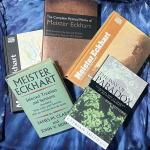
Our Questions Matter More Than Our Answers
Many of us are interested in spiritual life because we are looking for answers to our questions.
We live in a world where questions can be a challenge. It is easy for us to believe life is all about finding answers.
Most of us do not really appreciate our questions. They might make us feel nervous and a little uncomfortable. We do not want to have them, what we want are the answers we are trying to find.
We tend to value certainty and knowing much more than we appreciate asking well. Asking is all about taking steps toward finding answers.
We look for answers particularly when it comes to spiritual life. Many of us want to know what specific things mean. We do not want an estimate or a guess about what they mean, but to know what they actually mean.
Asking questions is all about finding answers we trust.
It is easy for us to look at spiritual life like something out of a mystery novel or a fantasy movie. We have grown accustomed to characters gathering pieces and putting them together to solve the puzzle.
Some of us approach spiritual life as a way to fit all the pieces together so we can earn new life.
My experience of spiritual life has taught me a different way of understanding and experiencing it.
I do not believe we are taking steps toward finding answers. Some of my favorite questions open me to further questions.
How we ask changes the way we reflect and think about things. Life, even spiritual life, is not simply about finding answers.
We take time to listen to sacred stillness. Our wondering and our doubts show us new directions to explore.
Why Do Our Questions Matter?
We live lives fixated on the importance of answers.
The point of living in the Information Age appears to be having easy access to answers. We expect to be able to find them with a few clicks or keystrokes. Our great institutions of education, commerce, even spiritual life focus on finding answers.
We assess and evaluate answers and information almost before we have even heard them. We want people to give us the bottom line, to summarize their work and give us their answer. Finding answers, accurate answers, seems to be central to our lives.
We appreciate people who give us concise, coherent answers. Answers are powerful and profitable.
Some of us have forgotten the power of asking our questions. We research online by entering key words. Clear answers are apparently available to us without really knowing what we are asking.
We concentrate so much of our attention on answers we forget why we are asking.
Some people do not even wait for us to finish asking before they start talking.
Part of the value of accurate answers is they are transitory. The significant answers change and adapt, as our ability to understand them changes.
One of the values of asking well is we tend to grow stronger over time. Some of us are asking the same questions we were asking years ago. Answers may become clearer to us as we continue to ask them.
Some clear, accurate, understandable answers can help us. Insightful questions are keys to open the locked doors behind which answers, and more questions, are hidden.
There are times when we are not seeking information. The answers we can research online are often not particularly satisfying.
We are asking for something deeper than the answers we can find. Asking well allows us to go further and explore deeper territory.
Our Questions Matter For Their Own Sake
We talk about people being overcome or wracked by doubt or being consumed by questions.
I think it would be more helpful to think about people being stopped short by answers.
One of the great limitations of answers is they cause us to stop looking, stop exploring. Our questions often open us to new questions. When we find answers we often stop asking.
Our intellectual energy shifts from curiosity and asking to defending answers we have found.
Fortunately we live at a time when there are many reasons our questions matter. Each branch of every academic discipline generates its own vocabulary which gives us endless ways to explore and discover.
What does that word mean? Where did it come from? Who came up with that? How does it work?
Some of us seem to believe not being inquisitive makes us appear smarter. We apparently think not needing to ask means we already understand things.
My experience is valuing questions creates interesting new conversations. Most people already know there are things we do not understand and they would like to help us.
Our asking sparks opportunities for new collaboration and new understanding.
Our Questions Help Us Learn and Grow
We face a choice between living life, especially spiritual life, or merely allowing it to happen around us.
If we unquestioningly watch life happening around us it passes by without engaging us. Some of us talk about sleepwalking our way through our days or never really waking up. We close our eyes to what life is offering us.
Asking and valuing questions allows us to live our lives more fully.
Spiritual life can seem intimidating or overwhelming. Some of us believe spiritual life has left us lonely or in pain and we are afraid to ask our questions. We may feel the questions we have already asked have not been answered.
It is central and essential to spiritual life for us to keep asking valuable questions.
Our questions are not insignificant distractions. Spiritual life is about the deep truths we explore by asking questions. Our questions carry spiritual value and power.
There is more spiritual life in our questions than in the hushed cathedrals where some of us seem to believe God lives.
How will we put our believe our questions matter into practice today?
When will we show the people around us our questions matter this week?
[Image by walknboston]
Greg Richardson is a spiritual director in Southern California. He is a recovering assistant district attorney and associate university professor, and is a lay Oblate with New Camaldoli Hermitage near Big Sur, California. Greg’s website is StrategicMonk.com and his email address is StrategicMonk@gmail.com.

















